Philip K. Dick’s Electric Dreams is a US/UK produced anthology series adapting ten of Dick’s short stories for the big screen. It’s very much in the Black Mirror style, presenting standalone episodes with strongly individual visual identities under a single banner. It starts airing in the US today (January 12th)) on Amazon Video—but thanks to some, shall we say, eccentric scheduling decisions, the first six episodes aired in the UK last year.
Here’s your guide to what to expect (avoiding major spoilers, of course), and which episodes to seek out!
Opening with “The Hood Maker” is one of the smartest choices the show makes. Julian Jarrold’s direction is Blade Runner by way of Dredd—all carefully aged vintage clothing, dust, and heat. That stylistic base gives Matthew Graham’s script something to stand up on; the episode opens confidently and never lets up.
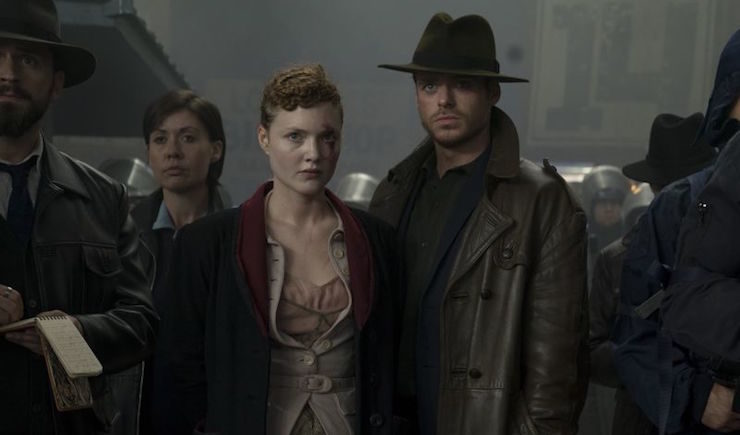
In an authoritarian state called the Free Union, telepaths have developed. Hated and feared, and easily distinguishable by a birth mark/scar crossing one of their eyes, the “teeps” are at the centre of massive political unrest. Then Agent Ross (Richard Madden) is assigned a telepathic partner, Honor (Holliday Grainger), just as someone appears to have developed anti-teep technology…
This premise develops as tautly as one could hope, and as we spend more time on the streets of this world held together with fraying good will, it becomes clear just how impressive a feat the episode is. From the surreal image that opens it (Honor standing in a river), to the closing moments, this is an hour of TV that’s charged with all the tension of the second before the punch is thrown. Massive change has affected this world and you have to watch the full hour to fully realise what it is, and who’s on which side of history. The result is a deeply satisfying piece of storytelling that could, perhaps, use an extra 10 minutes. In fact, it could perhaps support another whole season’s worth of stories. This is rich, complex, thematically clever, and visually elegant science fiction, and it’s a great start to the season. Plus, Madden continues to show just how good a leading man he is and Grainger is phenomenal—Honor is never anyone’s victim, but is almost always unsure of her strength. The power dynamic, and who your sympathies lie with, will change constantly. I’m still not sure if I ended up on the right side. I do know I enjoyed getting there.
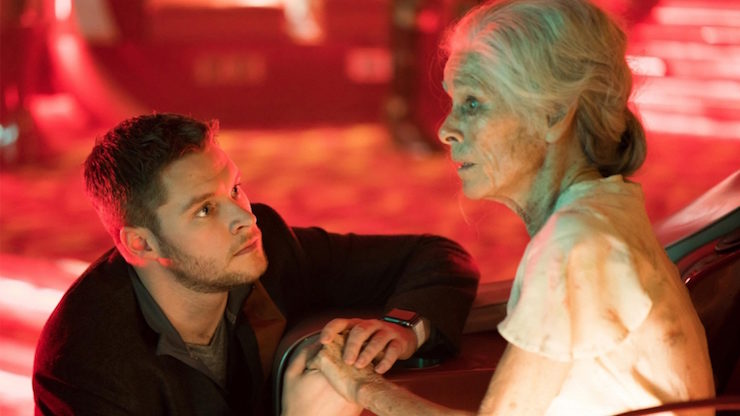
How you react to the second episode, “Impossible Planet,” will depend on how you feel about ambiguity. The Night Manager’s David Farr adapted and directed the short story and keeps the core of it very much intact: a pair of space chancers con a very old lady out of her money, leading her to a world that they’ve convinced her is Earth.
Farr adds in some extra material and swaps out the original ending. That saw an offhanded reveal that they had in fact gone back to Earth after all but here that’s much less certain. The same basic events spin out, but there’s another element introduced which makes the story far stranger and, for most of its running time, better.
Norton, played by Sing Street’s excellent Jack Reynor, is shot down for yet another promotion as the episode opens. That dissatisfaction, and the growing tension with his girlfriend, are central to him signing onto the “mission.” As time goes on, he gets flashes of grass, sunshine, bike wheels—there is a very strong hint that something strange is going on. Norton and Irma Louise Gordon, his passenger (played with determined charm by Geraldine Chaplin), may have met before.
There’s a lot to unpack in the episode, but you’re not quite sure just where you stand when all is said and done. The dystopian, career-driven future only needs iPhones and a YouTube sociopath on every screen to make it seem like the present day, and Norton and Andrew’s response to their job is a pleasingly mundane, if squalid, one. But then there’s Irma’s robotic servant. And the fact everyone seems to have lost Earth. And that ending…
“Impossible Planet” is a showcase for some excellent performances, especially the always-reliable Benedict Wong and the excellent Reynor, but in the end it’s not much more than that. If you’re looking for clear rationality, then don’t look here. If you’re looking for a science fiction story about the line between life and death, reality and hallucination, and whether either matters, this episode is definitely for you.

“The Commuter” is both a marked step up in quality and a massive increase in weirdness. Timothy Spall stars as Ed, a rail worker whose son is a borderline violent criminal; Ed’s marriage is held together by obligation and fear, and his job is an endless repetition of drudgery.
And then, one day, a commuter asks for a ticket to Macon Heights—a town that doesn’t quite exist.
Directed by Tom Harper and adapted by Jack Thorne, “The Commuter” is the solution to the equation that begins with British kitchen sink drama, Ken Loach movies, and Doctor Who. It’s imagery—sun-drenched fields and towns appearing out of the mist, contrasted with sodium-lit nighttime streets—is pure British drama, but its subject matter is very different. This is Frank Capra shot through with bile, a tragedy that we enter into sideways and leave on the same trajectory. Spall is extraordinarily good, as is Sense8’s Tuppence Middleton as the mysterious commuter. But what ultimately haunts the viewer is the same thing that haunts Ed: the possibility that this is all we get, and that happiness is a compromise. That the train really doesn’t stop at Macon Heights.
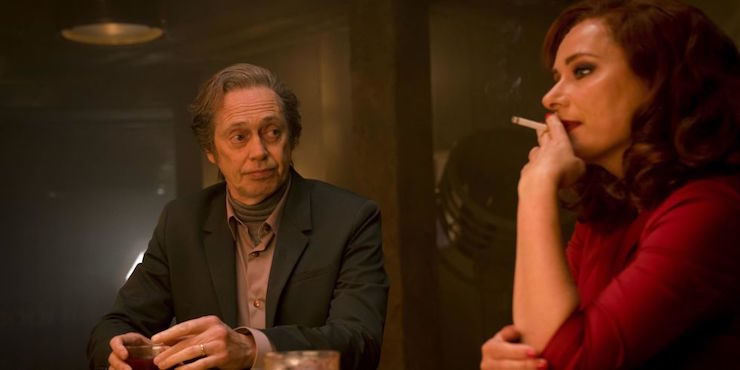
“Crazy Diamond,” directed by Marc Munden from a script by Toby Grisoni, is less successful. Based, loosely, on Dick’s story “Sales Pitch,” it stars Steve Buscemi and Julia Davis as Ed and Sally Morris. In an England rapidly falling apart due to coastal erosion, Ed works making QCs (Quantum Consciousnesses) for artificial humans. Jacks and Jills, as the synthetic humanoids are called, are functionally replicants and have the same issues with individuality and inception dates as their more famous counterparts. One particular Jill, played with noirish aplomb by Sidse Babett Knudsen, contacts Ed with an offer: help her steal some QCs—one to help her extend her lifespan, and the rest to sell for profit—and she’ll give him the money he needs to change his life forever.
The performances here are rock-solid. Buscemi is as great as he always is, and Julia Davis brings a welcome strength and stabilizing presence to what could otherwise have been a thankless role. Knudsen is the cast member who really shines, however; with Jill’s combination of barely-contained threat, desperation, and plausibility, she’s an engaging, endlessly likeable and sympathetic femme fatale.
The problem here lies in the final act. Reality, fantasy, and perception overwrite one another in a way that’s aiming for clever ambiguity but instead presents as muddy and a little annoying. There’s lots to debate here, just as with “The Commuter,” but it feels forced in a way the previous story never does.
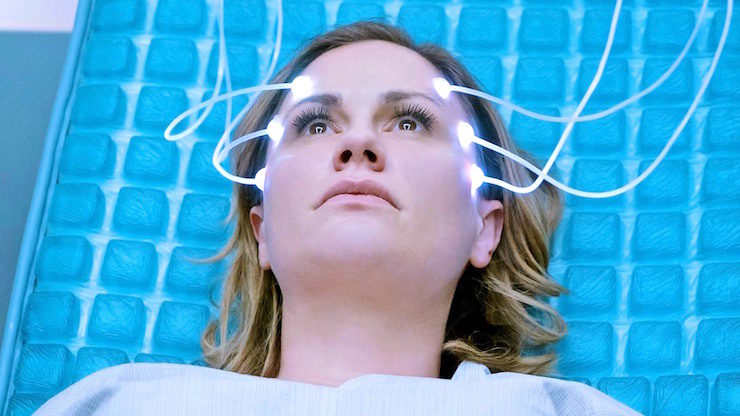
“Real Life,” adapted by Ronald D. Moore from “Exhibit Piece” and directed by Jeffrey Reiner, does much better work with very similar material. Anna Paquin stars as Anna, a homicide cop and survivor of a recent, horrifying attack. She’s driven, obsessive, and in need of a break. When her wife, Katie, brings a prototype home from work she gets her chance; it’s a VR system that will give her an entirely different life, one generated by her subconscious.
In that life, Anna is George. Played by Terrence Howard, George and his best friend Chris (Genre stalwart Sam Witwer) are hunting the murderer of George’s wife. Who is also Katie…
This sort of identity-driven drama is Moore’s bread and butter and the script sprints along. Paquin, the always-excellent Rachelle Lefevre as Katie, Lara Pulver as the mysterious Paula, and Howard all impress. Paquin, Lefevre, and Pulver are especially good and the script is at its best when they’re front and centre and busily questioning everything. Reiner’s direction is top-notch, too, and there’s some clever, even elegant cinematography.
Once again, the problem comes with the ending, and what it means. Moore rolls the dice perhaps one time too many and the episode’s final scenes could well, and justifiably, annoy a lot of viewers. However, where the ambiguity in “Crazy Diamond” comes off as annoying, here it’s contextual and chewy—if not, as I say, entirely successful.
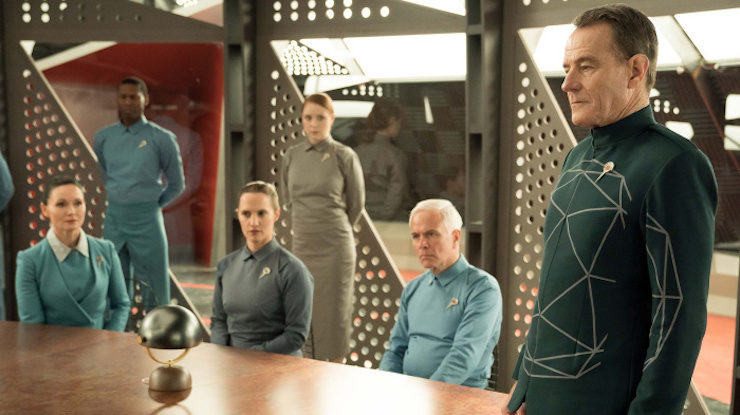
“Human Is,” the final episode to air in the UK to date, forms the third act of an unofficial trilogy with the previous two stories. Directed by Francesca Gregorini and adapted from Dick’s story of the same name by Jessica Mecklenburg, it stars Bryan Cranston and Miss Fisher’s Murder Mysteries star Essie Davis. Cranston (also the series’ executive producer), plays Silas Herrick, an Earth soldier. Davis plays Vera Herrick, Silas’ wife and the director of a mission to retrieve an alien substance that will scrub Earth’s toxic atmosphere clean. This latest attempt to steal the artifact goes catastrophically wrong and the force sent to retrieve it are massacred by the inhabitants of the alien planet. Only Silas and one other soldier survive, and something is very different about both of them.
“Human Is” is by far the most successful segment of this mini-trilogy. Where “Crazy Diamond” and “Real Life” spread themselves too thin, “Human Is” is the story of the Herricks. Their marriage, loveless and borderline abusive as the episode opens, is the lens through which we view humanity: conflicted, desperate, and willing to steamroll everything that makes us good in order to reach what we need to survive. Cranston is great as Silas, and we buy his turn from cold, cruel soldier to caring husband within seconds of the shift taking place.
But the heart of the episode is Davis, and the way she shows us who Vera is and how she survives. Her shared friendship with an aide, who is all too aware of what Silas is like, is a connection that rings true for anyone who’s been in an abusive or unhappy relationship. Vera’s dogged compassion and determination, contrasted with the ways she blows off steam, give us an insight into the sort of complex survival strategies necessary for someone in her situation, as well. Best of all, “Human Is” is the only one of these three episodes to unequivocally stick the landing. The final scene tells us three things: that Vera is very smart, very tired of what she’s had to put up with, and deeply in love. The courage and intelligence Davis shows in the second half of the episode in particular is riveting, and it ends this initial run of episodes on the same high note it begins on—although of course, four more episodes remain to be seen.
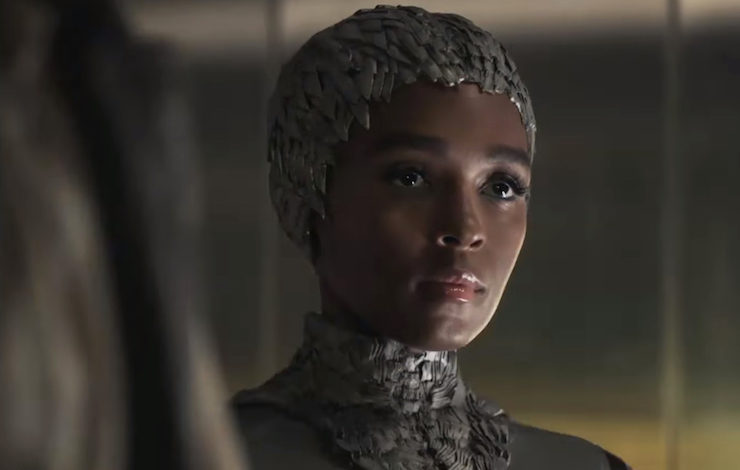
“Kill All Others” (based on “The Hanging Starter”), “Autofac,” “Safe and Sound” (based on “Foster, You’re Dead!”), and “Father Thing” complete the run and will, presumably, roll out in the UK to coincide with the US airing. I can’t wait to see them, because for all the variation in quality, there’s one unifying factor across all of these episodes: an absolute willingness to engage with the best aspects of classic science fiction and the ambition to update it for a modern audience. Weird, ambitious, uncomfortable, and necessary, Philip K. Dick’s Electric Dreams is an absolute must—especially for anyone suffering from Black Mirror withdrawal.
Alasdair Stuart is a freelancer writer, RPG writer and podcaster. He owns Escape Artists, who publish the short fiction podcasts Escape Pod, Pseudopod, Podcastle, Cast of Wonders, and the magazine Mothership Zeta. He blogs enthusiastically about pop culture, cooking and exercise at Alasdairstuart.com, and tweets @AlasdairStuart.










